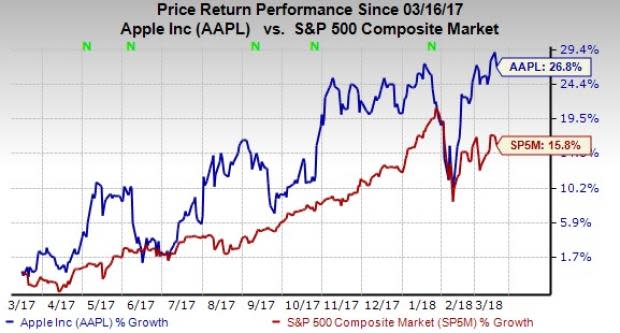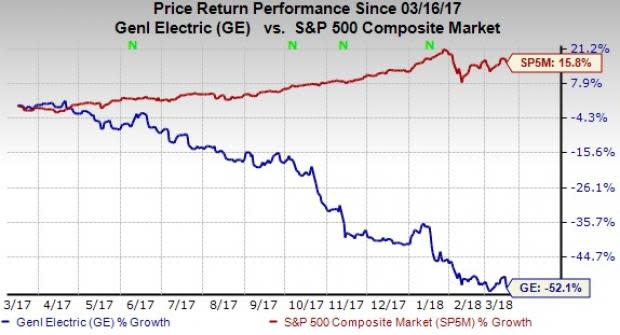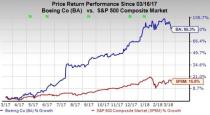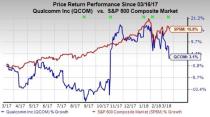U.S.-China Trade War Tensions Escalate: 5 Stocks At Risk
President Donald Trump’s deliberation of imposing indefinite tariffs on Chinese imports has placed the U.S.-China trade relations on tenterhooks. Trump is also considering investment as well as travel restrictions on China.
The tough stance stems from adverse findings against China in an investigation conducted by the U.S. Trade Representative Robert Lighthizer under Section 301 of the Trade Act of 1974.
Per CNBC, Trump has rejected a tariff proposal worth $30 billion (Euro 24.23 billion roughly) on Chinese imports for a much steeper figure of almost $60 billion (approximately Euro 48.46 billion).
Trump administration is also putting pressure on China to cut its trade surplus with the United States by $100 billion. According to U.S. Census Bureau data, quoted by Reuters, U.S. trade deficit with China was a record $375 billion in 2017, “almost two-thirds of a global $566 billion U.S. trade gap.”
Following the news, The Dow Jones Industrial Average fell 1%, the S&P 500 index lost 0.57% and the Nasdaq Composite dropped 0.19%. Per CNBC, the S&P industrial stocks were the worst hit, declining 1.02%.
Economic Protectionism to Hurt the United States
Trump has already imposed tariffs on steel (25%) and aluminium (10%) along with solar panel and washing machines. The President is likely to cite “national security” as the reason behind imposing tariffs and to bypass WTO regulations.
The import tariff means that products imported from foreign countries (in this case expect Mexico, Canada and few others) becomes more expensive, giving a boost to domestic manufacturers of steel and aluminium. Moreover, import tariffs limit dumping of cheap quality products in the market, which China allegedly does.
Trump is using a little-known section of the Tariff Act of 1930, which allows President to impose tariff of up to 50% and can also block imports completely, if required.
However, tariff imposition has faced significant criticism from analysts and consumers on the fear that American manufacturing may suffer from rising steel and aluminium prices. The trade restrictions are expected to hurt downstream U.S. industries.
Further, a prolonged high price of raw materials will eventually dent profitability and hurt job growth, which will be harmful for the U.S. economy.
Moreover, trade partners like the European Union (EU) are gearing up to implement their own sanctions. Reportedly EU is drawing plans to impose tariffs on the Harley Davidson motorcycles and Jack Daniels bourbon.
Import Tariffs to Shrink China’s GDP: How Will It Retaliate?
The newly proposed $60 billion import tariff on China is now likely to target technology, telecom and apparel sectors. However, this can have an enormous impact on the overall U.S.–China relationship.
Per a latest report from Business Standard, which quoted United States International Trade Commission (“ITC”) 2016 figures, electronic products (39%) and textiles & apparel (9.7%) were the principal products China imports to the United States.
Moreover, according to the American Apparel and Footwear Association 98% of shoes and 97% of clothing sold in the United States is imported and most of it comes from China.
Per CNBC, the United States is China’s biggest export market, accounting for more than 18% of total export. Trump’s tariff imposition is anticipated to shrink that amount significantly, resulting in collapse of businesses and job losses.
Moreover, the U.S. tariff imposition can encourage its allies to become hostile toward China, further hurting export capabilities. These will eventually hurt China’s Gross Domestic Product (GDP).
Although China’s trade minister has sought to calm tensions with the United States, it is widely anticipated that the country will eventually retaliate with its own sanctions not only against the United States but also against U.S. allies South Korea and Japan.
China can also target well-known U.S.-based companies with tax and antitrust probes. It is a well-known fact that American companies face significant protectionism in China. In such a scenario, an escalating trade war can seriously hurt U.S.-based stocks, particularly those that have significant exposure to China.
5 Stocks at Risk
Boeing BA is particularly vulnerable to any kind of retaliation from China. This was evident from the 2.5% decline in share price on Mar 14.
China is poised to become the world’s biggest airplane market. In November 2017, during a state visit by Donald Trump to Beijing, Boeing inked agreement to sell 300 planes worth $37 billion at list prices with China Aviation Supplies Holding Company. Boeing estimates that China will buy as much as $1.1 trillion of aircraft over the next 20 years.
Boeing faces significant competition in China from its European counterpart Airbus. Hence, any Chinese sanction can jeopardize its competitive position.
The stock has returned 85.3% in the past year, significantly outperforming 15.8% rally of the S&P 500 index. Boeing sports Zacks Rank #1 (Strong Buy). You can see the complete list of today’s Zacks #1 Rank stocks here.

Apple AAPL is dependent on China as a manufacturing hub. The company has set up a new research and development (R&D) center at the Shenzhen manufacturing hub in China. Hence, any sanction by China can have serious impact on its top-line growth and profitability.
Moreover, China remains an important market for Apple, given the growing number of middle-class customers. In the last quarter, Greater China accounted for 20.3% of sales. The company stated that new and switching users made up more than 70% of all iPad sales in China. Moreover, 90% of the Mac sales were first time buyers and switchers in China.
Apple carries Zacks Rank #3 (Hold). The stock has returned 26.8% in the past year, significantly outperforming S&P 500 index.

Mobile chip-maker Qualcomm QCOM generates significant revenues from China primarily through royalties. The company has signed multiple licensing deals with various Chinese smartphone makers including Xiaomi and Gionee.
Notably, China is the most important market for Qualcomm after the United States. The company’s long pending acquisition of NXP Semiconductors NV still needs approval in China. An escalation in trade-war between China and the United States can further delay the deal, which doesn’t bode well for the company.
Qualcomm also has a Zacks Rank #3 and returned 3.1% in the past year, significantly underperforming S&P 500 index.

Walmart WMT has roughly 400-strong network of stores across the Mainland China. The company has partnered with JD.com to compete against the likes of Alibaba as well as the U.S.-based Amazon. Walmart reportedly has a 12% stake in JD.com.
Walmart in collaboration with IBM has launched a blockchain-enabled food traceability solution that finds the genuine origin of food products in the country.
However, the biggest risk lies with Walmart’s Chinese suppliers in case of trade war. Import tariff on apparel can seriously hurt business, thereby disrupting Walmart’s supply chain. Moreover, the company’s investments can also come under threat.
Walmart carries a Zacks Rank #3. The stock has returned 24.5% in the past year, better than the S&P 500 index.

General Electric GE has significant exposure to China. Reportedly, the company has 37 manufacturing bases and eight research teams in the country. The company has inked partnership with a number of Chinese state firms particularly in the power sector.
GE has also partnership with Silk Road infrastructure fund and state-owned China Export and Credit Insurance to offer financing services to replenish power plant constructions.
The company also signed jet engine deals worth $2.5 billion during Trump’s visit to Beijing. Moreover, GE’s power division signed a partnership agreement with China Datang Group to provide gas and steam-powered turbines as well as components worth $1 billion.
Considering these factors we believe GE will lose significantly if a trade war erupts between the United States and China.
GE has lost 52.1% in the past year, significantly underperforming the S&P 500 index. The company has a Zacks Rank #4 (Sell).

Can Hackers Put Money INTO Your Portfolio?
Earlier this month, credit bureau Equifax announced a massive data breach affecting 2 out of every 3 Americans. The cybersecurity industry is expanding quickly in response to this and similar events. But some stocks are better investments than others.
Zacks has just released Cybersecurity! An Investor’s Guide to help Zacks.com readers make the most of the $170 billion per year investment opportunity created by hackers and other threats. It reveals 4 stocks worth looking into right away.
Download the new report now>>
Want the latest recommendations from Zacks Investment Research? Today, you can download 7 Best Stocks for the Next 30 Days. Click to get this free report
QUALCOMM Incorporated (QCOM) : Free Stock Analysis Report
Boeing Company (The) (BA) : Free Stock Analysis Report
Apple Inc. (AAPL) : Free Stock Analysis Report
General Electric Company (GE) : Free Stock Analysis Report
Wal-Mart Stores, Inc. (WMT) : Free Stock Analysis Report
To read this article on Zacks.com click here.
Zacks Investment Research

 Yahoo Finance
Yahoo Finance 






